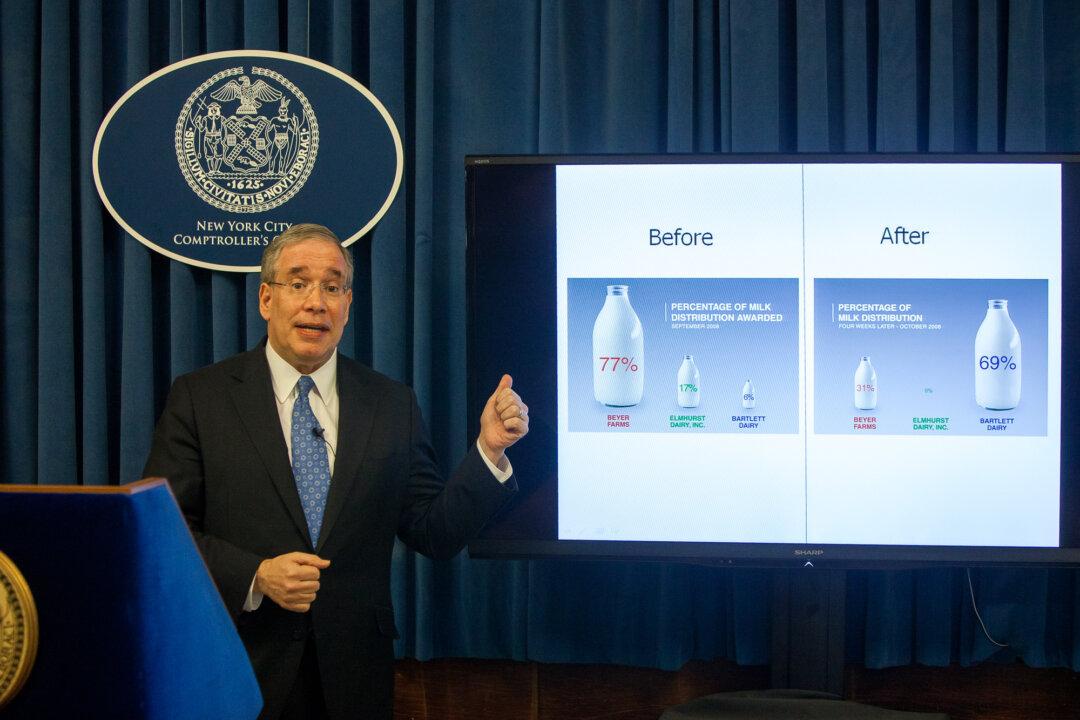NEW YORK—Suppliers of milk to New York City schools may have ripped the city off by agreeing on prices among themselves and subcontracting to each other.
An audit by the city comptroller’s office of food contracts awarded by the city’s Department of Education discovered red flags that suggested collusion.
Collusion is the illegal exchange of information or agreements between competitors Beyer Farms, Elmhurst Dairy, Inc., and Bartlett Dairy for public contracts. The three supplied milk to city schools between 2008 and 2013.
The contracts were worth $134 million. The supply to Bronx, Queens, and Brooklyn, more than three quarters of the contract, went to Beyer Farms, the one with the absolute lowest price.
Supply to Staten Island went to Bartlett for a nine percent higher price. Beyer didn’t offer a bid for Staten Island.
Supply to Manhattan went to Elmhurst Dairy for about 11 percent higher price. Beyer didn’t offer a bid for Manhattan either.
Each company was to be responsible for producing, processing and distributing the milk to the borough where the bid was won.
Yet the only company in the city able to process such a large amount of milk was the Elmhurst Dairy. So Beyer and Bartlett subcontracted all the processing to Elmhurst Dairy.
But Bartlett didn’t end up with the short end either, as Beyer subcontracted a majority of the distribution part of the work to Bartlett. And Elmhurst Dairy even subcontracted all of the distribution work to Bartlett.
According to Scott Stringer, the city’s comptroller, the arrangements happened between August and October 2008, “all before the first carton of milk had even been delivered.”
And so Beyer ended up responsible for a majority of the milk production and a piece of the distribution.
Bartlett ended up with majority of the distribution and a piece of production.
And “our friend Elmhurst,” as Stringer put it, ended up with a piece of the production and all of the processing work.
“What you see here is three winning bidders who began as competitors and then, remarkably, became partners within two months,” Stringer said during a press conference on Feb. 26, announcing the audit results.
Analyzing the structure of the prices the companies offered for supplying the milk to each borough, the comptroller suspected the companies agreed upon the prices among themselves beforehand, so each would end up winning in a predetermined part of the city.
Stringer wasn’t able to say if the milk prices got inflated because of the suspected collusion. He said it is “hard to assess” how much money the city may have lost.
Worth noting, Beyer Dairy went bankrupt in 2012, and the Department of Education (DOE) contracted with the other two companies for the remaining six months of the milk supply Beyer was unable to deliver on.
The Office of the Comptroller gave the audit results to the DOE in August 2013.
After a two-month exchange of opinions, the DOE sent an official response saying it did everything correctly. However, the department agreed to make the requirements for future contracts more detailed.
It is unlikely the DOE enhanced its regulations for its current milk contracts, as the Request for Proposals was already issued, and the DOE is now in the process of deciding the winners.
The comptroller’s office referred the case to the Department of Justice.





